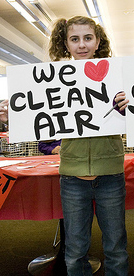Uncategorized
Big D’s BFD
 Did you feel the ground shifting under your feet yesterday around 5 pm? It was another one of those local earthquakes caused by fracking. The epicenter was Dallas City Hall. Damage to the gas industry's rhetoric and credibility was extensive.
Did you feel the ground shifting under your feet yesterday around 5 pm? It was another one of those local earthquakes caused by fracking. The epicenter was Dallas City Hall. Damage to the gas industry's rhetoric and credibility was extensive.
By a vote of 14 to 1, the Dallas Plan Commission pronounced the permissive "Fort Worth Model" of regulating the drilling and production of natural gas in the Barnett Shale dead. The passing was definitive. As John Cleese might say, "This paradigm is no more…it has ceased to be…this is an EX-paradigm."
It didn't go down without a fight. Up until the very final hours of debate over language in the City's proposed new gas ordinance, staff was still offering weaker versions of rules to Commission members because "that's the way Fort Worth did it." They were all rejected in favor of stricter standards as part of what has the potential to be the most protective ordinance in the Barnett Shale.
Now all we have to do is get eight Dallas City Council members to help us realize that potential.
The draft passed yesterday isn't 100% of what residents want, and in one case doesn't even match the level of protection Dallas itself started out with in 2007. It still provides paths through the bureaucracy for drilling in parks and flood plains, instead of outright bans, and despite staff assurances, the chemical disclosure language isn't foolproof. But to see it only through the lens of what it's not yet doing is to ignore the huge impact of what it already does. Coming from the largest city in the Shale, the Dallas draft immediately offers a modern, tougher alternative to Ft. Worth's submissiveness for dealing with the problems of mining gas in urban environments. To quote our Vice-President, it's a B.F.D. Some of the highlights include:
1) A 1,500 property line-to-property line setback from neighborhoods and other protected uses, matching the most protective setbacks in the Barnett Shale. It can only be reduced to a minimum of 1000 feet with a variance, and that's only possible with 12 out of 15 council votes. Notice of any permit must go out in English and Spanish to all mailing addresses within 2000 feet and the applicant must hold a neighborhood meeting where the project is fully explained.
2) Electrification of all motors and engines on a drilling site. If operators want to make an exception and use combustion engines, they have to show why electrification isn't feasible, and the City has to agree.
3) Tough restrictions on where gas compressor stations can locate – only in heavy industry zoning districts, with the same 1,500 foot setbacks from neighborhoods and all other protected uses, fully enclosed, and they must use electric engines, not diesel or gas. Thanks to some quick pushback by residents and their allies on he Commission, we were able to win back all the rules that staff had excluded in their first take only 24 hours before the vote.
4) A ban on any injection wells in the City of Dallas.
5) A ban on fracking waste pits.
6) Requirements for a road repair agreement before a permit is even considered. This is above and beyond any other insurance or bonding requirement.
7) A recommendation to the Council that it establish a local air pollution off-sets program that would include natural gas facilities. Such a program would be the first of is kind in the nation and close a Clean Air Act loophole that exempts these facilities from participating in the federal off-sets program for smoggy "non-attainment areas."
8) Baseline testing of water, soil, air, and noise at every proposed site.
9) Individual non-toxic "tagging" of all fracking fluids used. Every operator will be required to put their unique chemical signature within the concoction they're pumping into the ground so that if any of it goes where it shouldn't, the offending well can be identified. It's DNA testing for fracking.
10) A recommendation to the Council that during drought conditions, it either charge substantially more for city water that's being used for fracking, or ban the use of city water for fracking all together.
11) A recommendation that the Council demand an additional letter of credit from operators beyond any other insurance or bond to cover uninsurable intentional acts of contamination, i.e. dumping waste into the Trinity River.
We're not in Cowtown anymore.
(There's not an online version of the final language up yet. We'll let you know when there is so you can look this thing over yourselves).
City attorney Tammy Palomino, always a reliable source of information, stated on the record that she believed the draft's language about chemical disclosure would cover all trade secrets, but we're not so sure. That's why we'll be asking the Council to add five simple words to this section that Ms. Palomino didn't: "with no exceptions for trade secrets."
Instead of banning drilling in the floodplain, the proposed ordinance makes it impractical, though not impossible. An operator would have to get a fill permit from the city, and approved by the Army Crop of Engineers, to build a mound that would elevate the entire drilling pad site out of the floodplain. Anyone who's seen the footage from Colorado's flooded gas plays over the last couple of weeks can identify the folly of this approach. What's to keep flood waters from eroding the elevated mound and taking the entire pad site down stream? Only the lack of a kind of levee-to-levee flood we've seen in Dallas before.
Park drilling provided the day's lesson in pretzel logic. A "protected use" includes a recreation area, "except when the operation site is on a public park, playground, or golf course." Then it's perfectly fine to have rig next to the swing set. Got it?
This is less protective than the original Dallas Park decision that preceded the notorious Suhm secret agreement with Trinity East. It called for the leasing of a park's mineral rights but banned surface drilling in any park. You could go under but not on. That's still the most sensible compromise but it went floundering for support yesterday.
Instead, the Park Board will have to request the City Council to hold "Chapter 26" public hearing, after which there must be a 3/4 vote of approval by the Council that officially concludes there's no other possible feasible use for the park land other than gas drilling.
Listening to the comments from many Commissioners right before the vote, one got the feeling that if they had to do it all over, they might not be so equivocal. Nevertheless, they all voted for the more convoluted approach. It's the most flawed part of the ordinance, especially in light of the outcry over allowing any drilling in any public park during the Trinity East fight.
With those exceptions, it was a banner day for residents who've been fighting this good fight for over three years now. It was the kind of day that after Trinity East's main lobbyist whined that the company just couldn't get the electrical hook-ups they needed (in the middle of Northwest Dallas by a major Interstate) during the public hearing right before the final vote, an influential conservative Commissioner successfully moved to amend the completed draft to make the section on mandatory electrification of compressor stations stronger. Ouch.
It was the kind of day when the only ally industry could muster among the 15 Plan Commissioners was the sometimes coherent Betty Culbreath, Dwaine Caraway's brand new gift to Dallas residents. Culbreath said she couldn't vote in conscience for a document that required so much from industry. She felt so passionate about the issue, she missed most of the Commission workshops over the past month or so where the ordinance language was debated. It'd be laughable except the council member who appointed her is now the Chair of the Council's Environmental Committee.
There's no official news about the timeline or process the Council will use to consider the draft now that it's been delivered to them. Despite the mostly winning day residents had on Thursday, its sobering to remember that we only got six votes to deny the Trinity East permits. We need at least two more to make sure this good ordinance stays intact, or gets even stronger.
Such a lopsided Commission result gives us a great running start to get those votes. Backsliding by Council members will be hard to pull-off publicly, although let's face it, some seem immune to embarrassment on this issue.
Cowtown circa 2008 will always be the industry's preferred template for regulation, because they mostly wrote the rules. Residents in the Shale now have a much more citizen-friendly 2013 Big D model they can use for counterpoint – if we can win ACT III of the Dallas Gas Wars.
Help Finish Act II of the Dallas Gas Wars on a High Note This Thursday
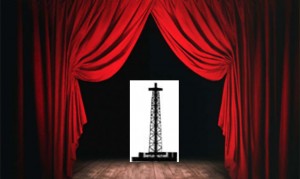 Act I was the rear-guard fight to keep the horrible Trinity East permits from getting approved.
Act I was the rear-guard fight to keep the horrible Trinity East permits from getting approved.
Act II has been about getting the most protective ordinance language for any future drilling we can from the members of the Dallas Plan Commission.
Act III will be about what kind of new drilling ordinance the Dallas City Council actually passes into law.
This Thursday at Dallas City Hall, Act II will come to a close with the final workshop and public hearing by the Plan Commission on a new Dallas gas drilling ordinance.
As usual, the public hearing is slated for 1:30 pm in the Council Chambers on the 6th floor. Immediately afterwards, the Commission will vote to send a draft ordinance to the full City Council.
Why is it important for you to come to this last hearing? Still pending or being reconsidered by the Commission is final language on park drilling, drilling in flood plains, insurance and bonding requirements, chemical disclosure requirements, and adding a 1500 foot setback to compressor station permits.
Because we don't know how many City Council members actually support building the most protective ordinance in the Barnett Shale, we must try to get the strongest language now at the Commission level, so that we have the momentum heading into Council consideration.
Council members are less likely to weaken strong provisions already written in by the Commission. On the other hand, any weaker provisions will likely be left weak unless citizens campaign for changes. So the draft of the ordinance submitted by the CPC on Thursday will be a very important starting point for the Council.
Make no mistake, your presence on Thursday is important and being watched. When you show up, you're saying you want a strong ordinance. By staying away, you're telling the Powers That Be that you'll set this round out. Don't let that happen at the exact moment industry is beginning to realize what we're accomplishing in Dallas. The ratio of drill, baby, drill proponents to citizens who want more aggressive protections crept up at the last public hearing on the 12th. Don't let it get any higher. We need you on Thursday to give a rousing send-off of the proposed draft ordinance to the Council.
Specifically, we must use the recent flooding of the gas fields in Colorado to call for a complete ban on drilling in the flood plain, or at least require those pad sites to be fully elevated out of the flood plain. Currently, only the rig must be elevated, leaving storage tanks and other pad site equipment vulnerable. Given what we've seen in Colorado, it'd be a big mistake to keep it that way.
What basic protections do we need in this ordinance?
1) A 1,500 foot setback for well pad sites from neighborhoods and other "protected uses."
2) COMPLETE disclosure of all chemicals used or stored on a well pad site – no exceptions for trade secrets.
3) A ban on drilling in parks
4) A complete ban on drilling in flood plains, or a requirement that the entire pad site must be elevated out fo the flood plain
5) Making sure the 1,500 setback from neighborhoods and other protected uses applies to compressor stations in addition to well pad sites
6) A ban on using City of Dallas water for fracking during droughts, and charging more for water used for fracking, since it's being permanently taken out of the hydrological cycle.
One last public hearing at the Plan Commission this Thursday and then it's all up to the City Council. Come and make sure it's a happy ending to Act II. And if we do well, we hear there's a special movie night on Friday to come and celebrate what we hope will be the most protective gas ordinance in the Barnett Shale.
Today is Giving Day: How We’re Earning Your Donation
Downwinders At Risk is proud to participate in Giving Day, the Communities Foundation's Region-Wide, Non-Profit, Day-Long Fundraising Marathon.
Contribute $25 or more to Downwinders at Risk's work through DonorBridgeTX.org to help us raise the $2,500 we need to pay our Director for September.
Just go to the special Downwinders contribution page at the Giving Day website and click and send your donation.
But Do It Now – Today Only
How We're Earning Your Giving Day Donation in September:
1) Medical professionals speaking out on air pollution in DFW
This Saturday afternoon September 21st, at 4 pm, will see the debut of a presentation by a new group of DFW medical professionals organized around air pollution issues called CLEAN AIR STAT at Arlington's annual Ecofest.
Dr. Robert A. Wiebe, MD, a former Director of Emergency Services at the Children's Medical Center of Dallas and Division Chief of Pediatric Emergency Medicine at the University of Texas, Southwestern Medical Center,will be walking citizens through the long list pollutants in the air we breathe, risks to their health, and what they can do about it. It's he first time a group of local DFW medical professionals have gotten together and made a presentation like this to the public.
Downwinders at Risk jump-started this new group of doctors and nurses concerned about air pollution because we know we need more professional medical testimony to win our fights. We're proud to announce its debut and look forward to helping it grow.
2) The best gas drilling ordinance in North Texas
Next Thursday, September 26th at 1:30 pm, the Dallas Plan Commission will hold its final public hearing on a new gas drilling ordinance for Dallas and then vote to send the the final product to the City Council.
The result is expected to be the single most protective set of rules for gas drilling and production ever drafted by a North Texas municipality.
This Dallas ordinance represents three years of work by Downwinders and its allies. We made a decision to take a stand in Dallas and build a new model ordinance that we could then use in other Barnett Shale cities. It's persistence that's paid off.
Now we have to protect what we've built from City Council opponents who want to weaken the ordinance. We're not through yet.
3) Continuing oversight of the Exide lead smelter clean-up
After a successful nine month fight to close the outlaw Exide lead smelter operating in the middle of Frisco, Downwinders has been helping its affiliate Frisco Unleaded to monitor the clean-up of the contaminated site.
We've exposed rampant pollution problems and warned about the dangers of leaving landfills full of lead waste in the Stewart Creek flood plain and upstream of Grand Park. We're also trying to get the Frisco City Council to understand that it can't wait for the state or EPA to act. The City of Frisco is going to have to take the lead if it wants the best, most modern clean-up that it can get.
We've been working with Frisco Unleaded to make a big announcement on October 1 about an opportunity for Frisco residents to express their support for a full and comprehensive clean-up coming up in November. Stay tuned.
4) Fighting for a better regional clean air plan
On September 5th, the Texas Commission on Environmental Quality hosted its first meeting on a new clean air plan for DFW to once again address the region's chronic smog problem.
Of all the local North Texas environmental groups, only Downwinders at Risk sent a representative to listen, and then ask important questions about Austin's new plan.
DFW has been in violation of the Clean Air Act for smog for 23 years in a row. The state has built at least four clean air plans during that time – none of which has succeeded. Only Downwinders is working with experts on building a new model for predicting air pollution problems in DFW that would provide the first real alternative to Austin's dubious planning abilities.
In the past, we've used these clean air plans to successfully reduce emissions from the Midlothian cement plants, local cars and East Texas coal plants. We're gearing up again for what's expected to be a three year battle over a clean air plan that really does the job.
you and your family's lungs.
Thanks very much.
We can't do this work without your support.
Give Cleaner Air a Chance This Thursday
Downwinders At Risk
Local, Determined, and Effective
Our Goal: $2,500 –
one month's salary for Director Jim Schermbeck
Every year the Dallas-based Communities Foundation sponsors a region-wide 18-hour fundraising marathon called "Giving Day" for local non-profits. This year, it's happening on Thursday.
From 7 am until 12 Midnight on Thursday you can contribute to Downwinders' work at the Foundation's special Giving Day website.
Donations of $25 or more can grow with matching funds and special rewards throughout the day. It's a great way to see your support of our work go further – sometimes by a lot.
This year, our goal is to raise a month's salary for our Director, Jim Schermbeck. That's $2,500. We know that's a lot for us in one day, but we think we have a good case to make.
Jim is the only full time professional staff person in Dallas-Fort Worth devoted to helping citizens in their fights for clean air.
His salary is where most of our budget goes. We hope you agree this is money well spent.
In the last five years, Downwinders has become one of the most effective and influential environmental groups in DFW. A list of our victories includes:
The cessation of hazardous waste burning at the Midlothian cement plants in southern DFW.
The closing or conversion of all seven older dirty wet kilns in Midlothian.
The closing of the outlaw Exide lead smelter in Frisco.
The denial of the awful Trinity East gas drilling permits in Dallas.
It's this track record of success that earned the group the very first Green Source Grassroots Environmental Leadership Award in 2012, voted on by our peers in the local environmental community.
We believe our ability to fund a professional staff person to assist local residents in their fights has been a major factor in our success.
Polluters and their allies usually have armies of lawyers, PR staff, and paid-for "technical experts." Citizens not so much.
Jim Schermbeck is Downwinders's attempt to balance the equation. He helps us bring decades of experience to every new fight. He helps find valuable resources and expertise. He helps teach citizens how to win.
DFW is the 4th largest metro area in the US. There are almost 7 million people who live here. We've had illegal levels of smog for at least the last 23 years. We host the largest concentration of cement manufacturing in the US, as well as the densest urban gas drilling field.
All this, and yet Jim is the only person who's available to offer full-time help for DFW residents who are fighting to get safe and legal air to breathe.
He's not on the staff of any large state or national group. His salary is raised by himself and the Downwinders' board of directors who all live in North Texas.
Our focus is here, where you live. Because it's where we live too.
We know many of you can't come to all the meetings and events we promote. But you still want to help us do our work. Thursday's Giving Day offers a great opportunity for anyone that can give $25 to help us a lot.
We tote the note for a local professional organizer because we believe it makes a decisive positive difference in the air we breathe and the rights we win.
If you agree, please show your support this Thursday by donating $25 or more to Downwinders at Risk at the Giving Day website.
Thanks very much for your support. We can't be successful without it.
Who Were the Most Environmentally-Friendly State Legislators this Past Session?
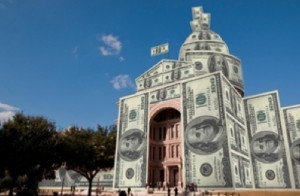 Austin-based Environment Texas released its bi-annual list of best and worst legislators for the just finished session. It's based on the recorded votes of members on eight or nine of the most high-profile environemental bills, good or bad, that were up for consideration in front of the entire Chamber.
Austin-based Environment Texas released its bi-annual list of best and worst legislators for the just finished session. It's based on the recorded votes of members on eight or nine of the most high-profile environemental bills, good or bad, that were up for consideration in front of the entire Chamber.
The Tea Party rebellion of 2010 has decimated the ranks of moderate Republicans who at lest tried to pay lip service to environemental protection. Now those are fighting words for the majority of Reublicans serving in Austin. Consequently, the lists are very lopsided.
Best in the Senate
In the Senate, three members drew a 100% perfect scores:
Sens. Rodney Ellis (D-Houston),
Jose Rodriguez (D-El Paso)
Sylvia Garcia (D-Houston).
Best in the House
In the House, twenty reps voted for major environmental bills 100 percent of the time:
Alma Allen (D-Houston)
Senfronia Thompson (D-Houston)
Hubert Vo (D-Houston)
Ron Reynolds (D-Houston)
Lon Burnam (D-Fort Worth)
Nicole Collier (D-Fort Worth)
Dawnna Dukes (D-Austin)
Elliott Naishtat (D-Austin)
Eddie Rodriguez (D-Austin)
Helen Giddings (D-Dallas)
Mary Gonzalez (D-El Paso)
Naomi Gonzalez (D-El Paso)
Marisa Marquez (D-El Paso)
Joe Moody (D-El Paso)
Roland Gutierrez (D-San Antonio)
Trey Martinez Fischer (D-San Antonio)
Justin Rodriguez (D-San Antonio)
Abel Herrero (D-Corpus Christi)
Poncho Nevarez (D-Del Rio)
Rene Olveira (D-Brownsville)
Worst in the Senate
Sens. Kelly Hancock (R-North Richland Hills)
Donna Campbell (R-New Braunfels)
Worst in the House
As the Texas observer noted – "Rep. Jonathan Stickland (R-Bedford) scored a whopping 13 percent. But he had stiff competition. Sixteen other GOP representatives voted for the environment just 22 – 25% of the time. These included plenty of North Texas Reps, including Arlington's Bill Zedler, Frisco's Pat Fallon, and Plano's Van Taylor.
Earth, Wind, (Water) and Fire: This Thursday’s Hearing on a New Dallas Gas Drilling Ordinance Covers a Lot
 There are only two more Plan Commission public hearings on a new gas ordinance before it goes to the full City Council. The first is this Thursday, September 12th, at 1:30 pm at City Hall on the 6th floor. The other is Thursday, September 26th at the same place and time.
There are only two more Plan Commission public hearings on a new gas ordinance before it goes to the full City Council. The first is this Thursday, September 12th, at 1:30 pm at City Hall on the 6th floor. The other is Thursday, September 26th at the same place and time.
After the last one, they vote on a draft to send to Council and go home, so if you want them to include good stuff in between now and when they finish up in 2 weeks, you probably need to come to this Thursday's hearing, which, you know, only covers minor stuff like "Air Quality," "Water Quality," "Compressor Stations," and "Pipelines ."
That's right, all those critically-important topics are on the table this Thursday at the Commission, both in the morning workshop and in the afternoon public hearing.
And because we're doing such good work and establishing some important precedents in Dallas, the gas industry is mobilizing opposition and trying to roll those precedents back.
You've already seen local congressman "Smokey Joe" Barton try and recruit oil and gas engineers to defend the Trinity East permits. Now District 3 Council member Vonciel Hill is becoming an industry puppet for a lax drilling ordinance with her presence in a letter in Monday's Dallas Morning News from a local minister who's church just happens to want to negotiate a gas lease in southwest Dallas – you know, the part of the city that looks like it's in the Hill Country?
To the Editor
This column accurately laid out the facts on the huge benefits of the oil and gas boom in our nation’s economy. We need more convincing reports like this.
Southwest Dallas lags far behind the rest of Dallas in jobs and community development. A strong coalition of southwest Dallas pastors recognizes this disparity.
The Dallas City Council has a stewardship responsibility to consider all the facts about the Barnett Shale drilling here, and not just listen to a vocal few. Our District 3 councilwoman, Vonciel Jones Hill, has favorably received a joint report from the coalition supporting oil and gas business in Dallas.
Southwest Dallas needs a financial boost. The major churches, colleges, institutes, and nonprofit operations out here all have a stake in the economic success of southwest Dallas. This means drilling on the large plots of open land. Because this region is underserved and undeveloped, there is much open land where drilling can be done without disturbing the few neighborhoods.
Only our City Council can send the prosperity away to other neighboring cities. The council should instead work with the coalition for improved economic benefits for southwest Dallas.
Robert Summers, southwest Dallas
We'll bet dollars to donuts that this letter wasn't inspired with the Rev. Summers his own self. For one thing, the Rev. has been totally absent up to now in the city-wide debate over gas drilling for the last three years. No appearances in front of the Plan commission or the City Council. But what do you also bet that we'll be seeing the Rev. Summers downtown on Thursday afternoon, making his debut testifying on behalf of more industry-friendly drilling regulations?
Please don't think this thing is a done deal. It's not. We need to keep our momentum going across a finish line that's now actually in sight. We know it's a drag, it's inconvenient, it's undemocratic, and it generally sucks, but we need Dallas residents to come back on Thursday and urge the Commission to keep taking proactive, protective stances toward urban drilling. What are the talking points for this Thursday? We're so glad you asked:
AIR QUALITY
Citizens' Recommendation 1: Make electric motors mandatory in all phases of drilling and production of gas – keep the current Dallas provision.
One of the single most important steps as policy makers you can take to reduce the amount of air pollution produced by the gas industry is to require the use of electric motors during all phases of production.
Some of the largest sources of smog-forming and toxic air pollution within the gas industry are large diesel engines. Use of these engines is justified in rural areas far from the electric grid. Within the city of Dallas, connecting to the grid should not be a problem. Industry representatives have said that electric alternatives exist for all diesels used in the industry save those in their trucking fleets.
Citizens' Recommendation 2: Recommend the Council continue to explore the establishment of a local off-sets program for air pollution caused by gas facilities.
Traditionally, in a smog-plagued region like DFW, EPA would require new polluters to “off-set” their pollution increases. For every ton of new pollution a large facility or power plant is going to emit, it would be required to reduce at least a ton of pollution in return. Off-sets are an established part of the Clean Air Act and work to put a brake on any new sources of air pollution that might disrupt air quality progress.
However, the facilities used to mine and process natural gas are diffuse over a large area. They’re not centralized like a power plant or a factory, and so under current federal law these facilities are not included in the federal off-sets program.
In the cover letter to the City Council that accompanied the Dallas Gas Drilling Task Force recommendations, Chair Lois Finkelman took favorable note of the idea of closing this loophole and establishing a local off-sets system and urged the Council to further explore the issue. Since then, off-sets have been endorsed by George W. Bush’s Regional EPA Administrator.
All we want from the Plan Commission is a recommendation that the Council go forward with discussions with the EPA on how the City could establish such a local off-sets program – the first one of its kind in the nation.
WATER QUALITY
Citizens' Recommendation: Ban gas drilling and production in flood plains to protect surface water quality.
A 2012 University of Texas report on fracking and groundwater contamination concluded that fracking was more likely to cause surface spills of chemicals than other types of drilling.
In its landmark 2006 planning document, forwardDallas!, the City described how important it was to keep the Trinity River flood plains from being overrun with development,
More than 10,000 acres of the city’s floodplain, however, is vacant and should be protected from development through acquisition, restoration and dedication of open space. As was made painfully clear along the Gulf Coast during the 2005 hurricane season, the loss of flood plains and other natural recharge areas not only negatively impacts water and air quality, it fails to minimize damage during floods. In addition to flood stabilization, reclaiming and restoring these areas would provide sites for recreation, wildlife habitat and buffers for riparian areas while improving water quality and lowering the heat island effect.
Water and open space are precious natural resources in Dallas in 2013. We need to protect our available inventory from contamination by a process that has a higher documented rate of spills and leaks than conventional drilling by keeping it out of our flood plains.
COMPRESSOR STATIONS
Citizens' Recommendation: Continue to ban centralized Compressor Stations.
It was clear the Dallas Gas Drilling Task Force thought the idea of the City hosting large centralized compressor stations was out of the question, and we believe the Plan Commission should maintain that stance on behalf of air quality and public health.
Southlake's gas ordinance, from which the Task Force borrowed heavily in formulating its own recommendations, has banned these facilities entirely.
The state awards what's called a Standard Operating Permit for compressors that allows them to emit up to 250 tons of air pollution a year without going through any public hearing or notice process. These are massive facilities, capable of churning out more smog-forming Volatile Organic Compounds every year than any single cement plant in Midlothian. The rejected Trinity East Compressor and refinery would have instantly become Dallas’ 10th largest air polluter the day it opened.
If the Plan Commission decides instead to regulate where and how these huge industrial polluters should be allowed to do business, we urge you to restrict their location to the appropriately zoned Industrial-Manufacturing area of the city with the same safeguards you provided for the location of gas wells in the city limits.
PIPELINES
Citizens' Recommendation: Gathering lines should be odorized for public safety.
Currently there’s no provision in the Dallas ordinance to odorize gathering lines from well head to compressor station, even though these lines are often more numerous than any other kind of gas pipeline. Leaks can’t be detected by smell alone the way they can in commercial gas lines, even though gathering lines are often more shallow, less sturdy, and can run closer to protected uses than larger pipelines.
These next two meetings of the Plan Commission have the potential to produce the single most protective gas drilling ordinance in the Barnett Shale. It's a turning point. If you can give an hand by coming down and saying you want these five things in the ordinance this Thursday, it would help the effort a lot.
Thanks so much for your continued support.
Mayor Mike Rawlings’ Statement on Trinity East and Urban Drilling in Dallas
The Trinity East Deal IS Done…Now.
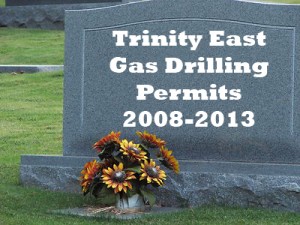 A secret back room deal between City Hall and gas driller Trintiy East that was once described as "a done deal" by City Council members is indeed finally done. As in done-in. As in dead as a door nail. As in exploding zombie-permit head dead.
A secret back room deal between City Hall and gas driller Trintiy East that was once described as "a done deal" by City Council members is indeed finally done. As in done-in. As in dead as a door nail. As in exploding zombie-permit head dead.
Thanks to an organizing campaign by the most successful citizens coalition in recent Dallas civic memory, the deal that Dallas City Hall could not possibly be stopped, was. Cold.
Wednesday afternoon the Dallas City Council could not find the votes to override the City Plan Commission and so gas drilling leases thst were signed in 2008 will now go unexploited in Northwest Dallas along the banks of the Trintity River.
It only took nine months of breathtakingly hard work, two Plan Commisison votes on either side of a "reconsideration" vote, a city election, disclosure of a secret memo, a city Manager resigning, a short film, fighting off a staff that wanted to steamroll us, hundreds of residents showing up month after month in person at multiple hearings, even more residents sending in letters, e-mails and phone calls to the members of the Plan Commission and Council, and a funky piece of butcher paper that turned into one of the most iconic images of the fight.
Come to Dallas City Hall Today and Kill Zombies
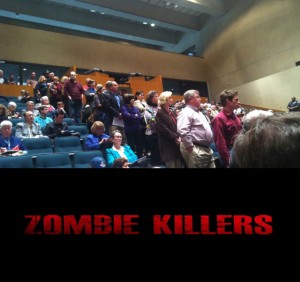 With any luck, this will be the last reminder from us about how you can make sure the Trinity East just-won't-stay-dead "zombie" gas permits in parklands and floodplains are never approved by the City of Dallas. Because today, Wednesday, August 28th, we're going down to City Hall. line up to take our turn at the podium, and watch them get buried for good.
With any luck, this will be the last reminder from us about how you can make sure the Trinity East just-won't-stay-dead "zombie" gas permits in parklands and floodplains are never approved by the City of Dallas. Because today, Wednesday, August 28th, we're going down to City Hall. line up to take our turn at the podium, and watch them get buried for good.
We're gathering at 12:30 pm on the 6th floor of City Hall just outside the Council Chambers to pick up last minute materials. Join us then or as soon as you can make it down. Mayor Rawlings could decide to take up the three Trinity East permits right after lunch or put it off until after other business. Likewise he could allow everyone that wants to speak on the issue 2 minutes a piece to do so, or he could limit both sides to 15 minutes a piece, os something in between. So be prepared to improvise.
This is an historic vote. It's the first time the Dallas City Council has actually been asked to give a thumbs up or down on a gas well permit. It comes after nine months of contentious debate that made gas drilling in Dallas the most important civic battle in recent memory and hastened the departure of former City Manager Mary Suhm after discovery of her infamous secret agreement to work with Trinity East to subvert current city policy in order to win approval of the permits.
Time and again, Suhm and Mayor Rawlings contorted the system to try and get the permits through. First, they scheduled the Plan Commission hearing and vote on the permits on December 22nd of last year hoping no citizens would show-up. That didn't work and the permits were denied by a narrow margin. So then the vote to deny was subject to an unusual "reconsideration" vote by the Plan Commission with no public hearing. That attempt to roll the denial back also failed when the Plan Commission voted for a second time to deny the permits.
That denial is why we don't even need a majority of the 15 council members to agree with us . We only need four opponents to the permits to block the super-majority needed to override the Plan Commission. It looks like we have them, but we still need you front and center speaking out and filling up the council chambers.
In just a month, this same city council will be getting the final draft of a new gas drilling ordinance from the Plan Commission and considering what to do with it. Give them a show of force today that will stick with them as they consider their course of action.
And after today's vote, come on over to Lee Harvey's and celebrate with us. And we promise you'll never have to read another alert about these thing again.
Canadian Government to Disclose Risk Assessments of New Chemicals BEFORE They Sit on Your Shelf
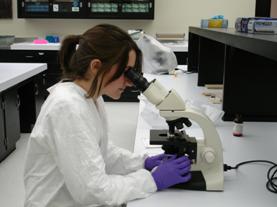 It's a baby step, but a imminently logical one that could pave the way for more precautionary principle-type regulatory measures in the future.
It's a baby step, but a imminently logical one that could pave the way for more precautionary principle-type regulatory measures in the future.
Beginning this fall, the Canadian environmental agency will start releasing risk assessment summaries of new chemicals when they're first proposed for use by industry, as opposed to after they hit the marketplace and potentially already causing problems. It's not a huge difference but it's one that realizes it's better to be transparent with chemical exposure risks before the chemicals are in wide use.
The government has previously not made public any details of its risk assessments of new substances. It has issued notices requiring notification of significant new activity or imposing conditions on the use of new substances, but without identifying them as new substances or indicating on what basis the requirements were being applied.
For existing chemicals, the government publishes draft versions of their screening assessment reviews for public comment, including details of how the substances are used, what risks they pose to the environment or human health, and how environmental and human exposure might occur. If a substance is deemed to pose a potential risk, the draft assessment is often accompanied by a proposed risk management approach. After the comment period ends, a final assessment is published, along with a finalized risk management approach and any regulatory or other control instruments deemed necessary.
Environment Canada said it will publish summaries of completed risk assessments for new chemicals and polymers for which the government has received notification from industry as of Jan. 1, 2013, and for which a Canada Gazette notice has been issued to impose restrictions–whether ministerial conditions on their use or requirements for notification of significant new manufacture, import, or use of the substance.
Of course, the risk assessments being released are those based on an increasingly obsolete model of human physiology that don't take into account the numerous subtle harms inflicted by even small levels of exposure that were previously believed to be "safe." Substances like endocrine disrupters are not tested for their possible epigenetic harm. Even less exotic chemicals are not rigorously tested for their potential to cause birth defects, immune system damage, or other health problems on their way to the grocery store shelves.
There's also the familiar problem of disclosure of "trade secrets" to the public. Even with this new provision, there will be exemptions granted.
Still it's a good idea to look closely at the harm a substance might do to public health before its unleashed on the public. Too bad it's also still too novel.

